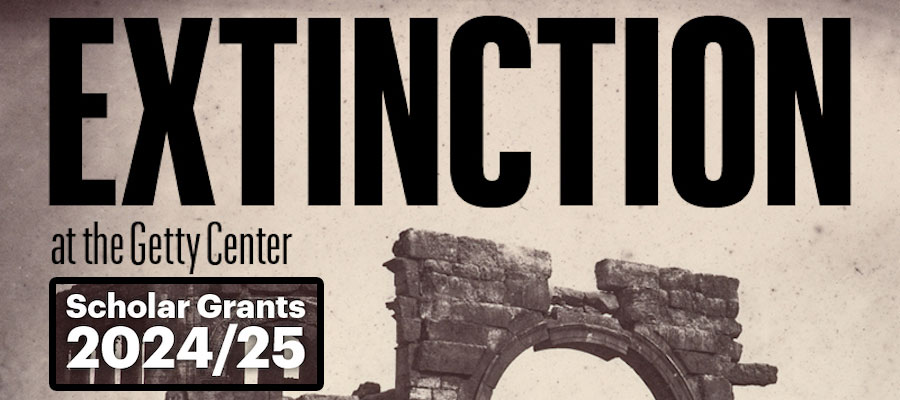The Getty Scholars Program supports researchers in advancing knowledge of the arts and humanities and producing cutting-edge scholarship that contributes to the understanding and preservation of cultural heritage. While in residence at the Getty Villa, scholars have the opportunity to spend significant time at one of the world’s premier art history collections while contributing to an international community committed to intellectual exploration and exchange.
Scholar Grant recipients at the Getty Center may be in residence from three to nine months:
- Three-month residency: September to December, January to March
- Six-month residency: September to March, January to June
- Nine-month residency: September to June
Applications are welcome from researchers of all nationalities who are working in the arts, humanities, or social sciences.
Applicants who received their degree after September 1, 2020 should apply for a postdoctoral fellowship.
2024-2025 Research Theme: Extinction
The arts have the capacity to mitigate against cultural loss by visualizing, capturing, and interpreting aspects of the fleeting, the ephemeral, and the unrecoverable. In this moment of extreme environmental decay and monumental epidemic loss, the Getty Scholars Program invites applications on the pressing topic of extinction and its bearing on the visual arts and cultural heritage. Scholars are asked to contemplate how representational practices are deployed to cope with the precarious survival of plants, animals, and humans; the ever-present specter of species-level extinction and resource exhaustion; and, at the most extreme pole, the brutality of mass atrocity. On another level, atrophy, decay, and obsolescence constitute the temporal dimensions of certain artistic practices, especially as creative approaches, technologies, media, formats, and ideals become outmoded or superseded. The finality of disappearance may also portend a certain amount of hope for rebirth, innovation, or recovery.
This year’s theme welcomes research topics that explore that which is lost, but also the urgent impulse toward preservation and permanence. Beyond loss, destruction, or mortality, the topic also seeks to explore the creative and productive possibilities that extinction may enable.
Guiding Questions:
- How have recent scientific or technological advances made it possible to visualize lost sites, beings, and objects?
- What new habitations and communities have emerged or survived from the processes and effects of extinction?
- Historians, archaeologists, and cultural heritage scholars work actively to preserve and protect certain categories of visual, material, and built culture. Yet there are cases in which obsolescence is warranted, even invited. What do we choose to save and why? Who decides upon the criteria and what is the logic?
- Many forms of human expression are not meant to endure, such as performance, storytelling, music, and dance. What is the relationship between artistic forms and cultural practices that have been lost and their more durable records and traces?
- The most devastating loss is that of entire cultures and groups, sometimes targets of intentional annihilation. How can precarious forms of indigenous knowledge and fragile cultural identities that are in danger of extinction be conveyed, preserved, and represented? How might communities challenge predictions and presumptions of extinction?
